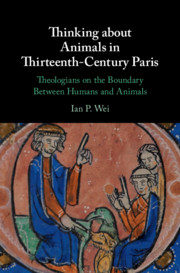
- Cited by 7
-
Cited byCrossref Citations
This Book has been cited by the following publications. This list is generated based on data provided by Crossref.
Oelze, Anselm 2021. Animal Minds in Medieval Latin Philosophy. Vol. 27, Issue. , p. 75.
Oelze, Anselm 2021. Animal Minds in Medieval Latin Philosophy. Vol. 27, Issue. , p. 1.
Gins, Sven 2021. Everything but the Squeal: The Politics of Porcinity in the Livre des Propriétés des Choses. Religions, Vol. 12, Issue. 4, p. 260.
Nicoll-Johnson, Evan and Ridgway, Benjamin 2023. Greening the global medieval: Exploring the cultural worlds of the Palaeoanthropocene in East Asia. postmedieval, Vol. 14, Issue. 4, p. 631.
Farrant, Timothy 2024. Mind, Soul and the Cosmos in the High Middle Ages. Vol. 31, Issue. , p. 107.
Cohen-Hanegbi, Naama and Erez, Guy 2024. The womb as a wild mother beast. postmedieval, Vol. 15, Issue. 2, p. 301.
Bird, Jessalynn L. 2024. The Crusades and Nature. p. 311.
- Publisher:
- Cambridge University Press
- Online publication date:
- August 2020
- Print publication year:
- 2020
- Online ISBN:
- 9781108907552


